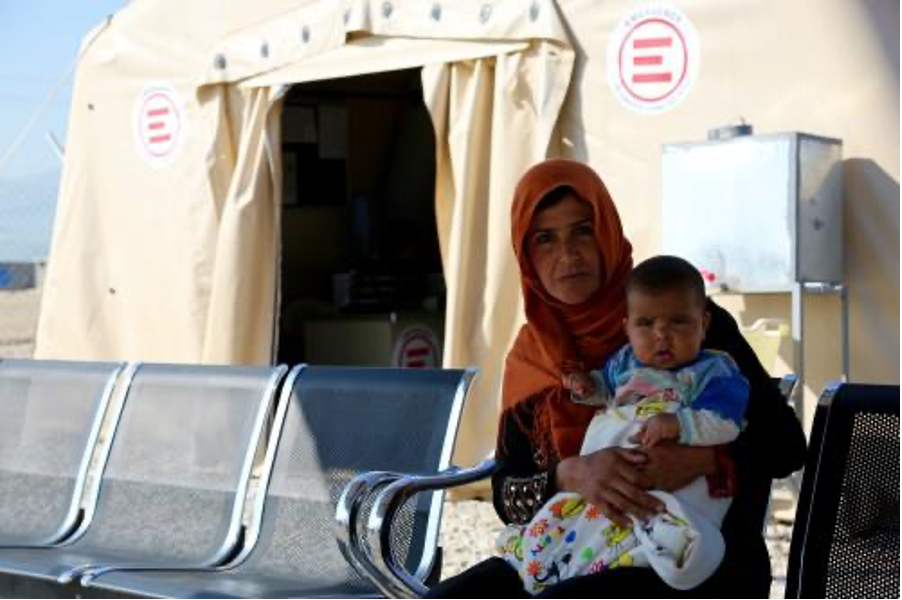Exploring Artistic Horizons: TPH's Inaugural Digital Art Session
From Escaping ISIS Hell to Camp Confinement: The Plight of IDPs in Sulaymaniyah
By Kakalaw Abdulla

An IDP with her child near a temporary clinic in Ashti camp. (Source: Emergency UK)
Nearly two thousand displaced families currently reside in a distressing camp situated 16 kilometers east of Sulaymaniyah, on the outskirts of a town called Arbat. Originally intended to provide temporary refuge and support for these families in the wake of the malicious acts of the Islamic State (ISIS), they now find themselves in a disheartening predicament. They can no longer envision a promising future that would allow them to return home.
Ashti (Peace) is one of the four camps in Sulaymaniyah for internally displaced people (IDPs) and refugees. The camp houses 1745 displaced families, most of whom are from Salahadin province, but others are from Mosul, Sinjar, and Diyala. It is overwhelmingly overcrowded, as it was initially built for 800 IDP families.
The Iraqi government is encouraging IDPs to return to their homes by offering limited financial incentives. However, a significant number of IDPs from Ashti are hesitant to go back due to their concerns about safety and security in their hometowns. They seek assurances of protection before considering the possibility of returning. Lack of basic infrastructure, services, and job opportunities are other reasons discouraging them to return.
"They don’t want to return because they think they won’t feel safe. Only three to four families return to their hometown monthly," said Amir Adil, head of the camp.
When ISIS ferociously swept across Iraq and took swathes of territory in 2014, Yezidis, Shabaks, Arabs, Christians, and Turkmen were forced to leave their homes and spread across camps in the Kurdistan region. They are provided with food and other basic services from the Kurdistan Regional Government (the KRG) and local and international organizations, namely WFP, UNICEF, and UNHCR.
"International organization's support for our camp is now very limited. We have significant problems, and one of them is sanitation. The sewage systems in the camp are completely occupied with filth, which could lead to numerous diseases, but no action is taken to resolve this issue," Adil said.
The scarcity of water and electricity poses another significant challenge in the camp, further exacerbating the difficult living conditions for its residents. The shortage of electricity compels them to leave their tents and seek refuge under the shade of trees or other tents, enduring hours of waiting for the power supply to be restored. This daily struggle adds to the hardships they face in their daily lives. All these hardships do not compare to what they are going through mentally because of the war in which they lost many members of their families. Nisaf Masi, a 50-year-old Yazidi woman, resides alone in the Ashti camp. Tragically, she has experienced the loss of 11 out of 27 members of her family. To this day, these individuals remain missing, a heartbreaking consequence of the mass abduction of thousands of Yazidis during the period when ISIS seized control of Sinjar in August 2014. Masi reveals that the mental toll inflicted by ISIS militants has left her emotionally unstable.
The Yazidis experienced numerous horrific acts, such as sexual enslavement, forced marriage, and genocide, when ISIS seized control of their homeland. During this time, their communities were destroyed, and more than 400,000 Yazidis fled. While efforts have been made to rescue and repatriate Yazidi women to their homeland, the fate of approximately 3,000 women is still unknown.
Fane Sulaiman, another Yazidi woman currently residing in the Ashti camp, shares her heartbreaking experience of the day her homeland was captured after nearly nine years of displacement. With deep sorrow in her heart and tears streaming down her cheeks, she recalls the tragic events that unfolded. "August 3rd is a dark day for the people of Sinjar. Most of our families and children were taken by IS militants, and most of them were killed while others, who were mostly girls and women, were kidnapped," Sulaiman recalled.
During these "dreadful" years, Sulaiman has been living in a state of constant anticipation, hoping for a phone call that could bring news about her abducted daughters, whose whereabouts remain unknown. She expresses that throughout this period, she has been continuously overwhelmed by sorrow, shedding tears incessantly. Despite the pain, her glimmer of hope sustains as she yearns for that long-awaited call.
IDPs continue to advocate for the search and clarification of the fate of their families. They emphasize that the situation in Sinjar remains unsafe, making it impossible for them to return home, resulting in their prolonged stay in displacement camps.
In late 2020, the Kurdistan Regional Government (KRG) and the Iraqi government made a deal to normalize the security of Sinjar by expelling different armed groups based there and establishing a new force, but that deal largely remains on paper and has not been translated into tangible improvements on the ground.
"While there is significant inadequacy in the camp, our lives here are better and we have been provided with basic needs," Sulaiman added.
Abdulla Ismaeel, a displaced Yazidi man residing in the camp and the husband of Fane Sulaiman, expresses his profound longing for their daughter, particularly the one who is 26 years old and was cruelly abducted by ISIS militants. He shares the immense void and pain that her absence has left in his life, emphasizing how much he deeply misses her.
"I’m still waiting for my children to come back. How could I forget them? They were everything to me," Ismaeel said. After nearly nine years, Ismaeel still urges authorities to find her missing children and the children of others and calls on the Iraqi government to compensate them both financially and mentally so that they can return home.
"The situation in Sinjar is unstable; that’s why we don’t want to go back. The authorities must reconstruct Sinjar so that we can hopefully go back one day," Ismaeel added.
According to a recent report by Human Rights Watch, funds allocated to reconstruct and rebuild Sinjar are being held up primarily because of the KRG and central government dispute.
The conflict has displaced nearly 3.4 million people within Iraq since early 2014, according to the International Organization for Migration (IOM). Along with Yazidis in Sinjar, most people from Salahadin and Diyala provinces were internally displaced too, and some of them still reside in the Ashti camp.
Ibrahim Abdulla, an IDP living in Ashti camp and originally from Salahadin, shares that they have endured numerous challenges over the past nine years. However, he expresses his hesitation to return to his hometown in the absence of comprehensive reconstruction efforts. He likens the current situation in his hometown to a desert, emphasizing the need for substantial campaigns for rebuilding.
"The Iraqi government should provide housing and job opportunities so that we can actually consider going back," Abdulla said. After the Iraqi government reclaimed its territories across the country and defeated ISIS in 2017, it initiated the so-called “stabilization program.” It was designed to facilitate the return of IDPs to their hometowns by offering financial incentives. The program was relatively successful, leading to the closure of all IDP camps within the government territories. However, there are still 34,000 IDPs remaining in the Kurdistan region.
"With accordance to official Iraqi government documents, we facilitate the return of IDP to their original home, which includes transportation and a financial incentive ranging around one million and 500 thousand Iraqi dinars (1000 dollars) for each family," said Samir Shukur, director of the Iraqi Ministry of Displacement and Migration branch office in Sulaymaniyah.
Shukur emphasizes that without proper basic services and job opportunities, these efforts are of no avail for IDPs living in the Kurdistan region.
Salima Mahmood, another IDP from Salahadin, says her children were born in the camp, and they don’t live a normal life with no foreseen future.
"My children were born and raised here. They are very far away from their hometown, which is very difficult for them considering that they were raised in a terrible situation. They don’t have real lives, and their future is bleak and in danger," Mahmood said.
